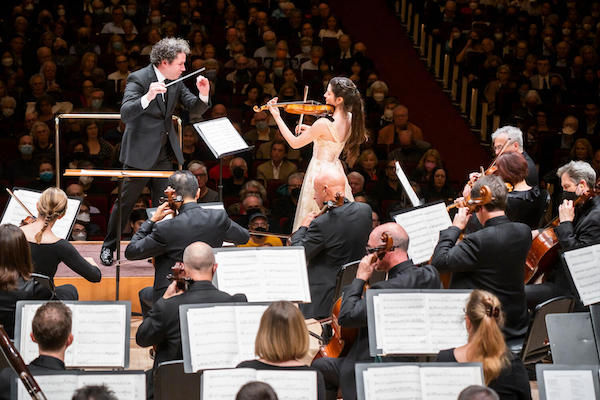Dudamel, LA Phil open Carnegie stand with compelling Ortiz, mixed Mahler

Perhaps it was the combination of ex-pats from California and some wishes among New Yorkers that Gustavo Dudamel, music director of the Los Angeles Philharmonic, will move east and replace Jaap van Zweden at the New York Philharmonic.
For whatever reasons, the audience was primed for the the LA orchestra’s Tuesday opening night at Carnegie Hall, the first of two consecutive concerts, in a program with a recent work from Gabriela Ortiz and Mahler’s Symphony No. 1.
Opening the evening was the local premiere of Gabriela Ortiz’s Altar de cuerda for Violin and Orchestra, and the crowd hooted for soloist Maria Dueñas as she stepped onstage. She gave a strong performance, playing with a singing, silvery tone, wielding a variety of timbres and attacks. This was a narrative approach to the music that brought out everything the score had to offer.
Ortiz has been accumulating an Altars series, less about the specific meaning of a religious altar than personal symbolism. This formal concerto—in three fast-slow-fast movements—was 21st century romanticism, with pictorial gestures and a dramatic shape. The music was about what it could describe, not just the notes coming together.
That was both a strength and a weakness. The strength was the overall energy and extroversion, especially as channeled through Dueñas’ playing and Ortiz’s orchestration. One had to be in tune with the composer’s colors and moods to get the full effect. When that happened, there were spectacular moments, like a passage in the slow movement that combined delicate chords in the strings with Tibetan singing bowls, producing a sound one had never heard before but hopes to hear again and again. Otherwise, that movement felt leaden and never got off the ground.
One admired Dueñas’ commitment to the music, and her performance was full of drive and passion, the crowd responding with equal fervor.
One has not yet been fully convinced by Dudamel’s way with Mahler, and Tuesday’s concert reinforced that uncertainty. Much of the performance was excellent, but some of it was off the mark. The orchestra’s playing was superb, especially that of the strings and brass; the crux was Dudamel’s interpretive decisions.
The opening was shining and serene, with a couple woodwind phases slightly imprecise, but the “Ging heut morgen” melody was a hair slow, enough to sap some resonance. The ramp up to the triumphant finale didn’t have much tension, so the ending felt out of balance.
In the Scherzo, the opening strokes were extremely heavy, and the landler never had enough bounce. Details like this are supposed to unleash the mood and meaning in the score, they’re not just notes, and these miscalculations, though slight, meant the full feeling wasn’t there. This changed once the waltz music in the movement arrived; this was absolutely wonderful, with beautiful string timbres and a gentle, lilting quality. The mood and meaning aligned.
The ironic third movement begun with Christopher Hanulik’s stellar bass solo, a great balance of expression and technique. The klezmer music that follows the “Bruder Martin” canon was light on the schmalz und schlag, but had fine color.
The final movement was expertly balanced and thrilling all the way through. The closing pages were tremendous and wiped away any remaining drawbacks from the previous movements.
The Los Angeles Philharmonic and Anne Akiko Myers play Gabriela Ortiz, Arturo Márquez, and Aaron Copland’s Symphony No. 3, 8 p.m. Wednesday carnegiehall.org
Posted Oct 26, 2022 at 3:32 pm by salomon suwalsky
The least “jewish” version of mahler’s 1st symphony.
Too wagnerian. Why?
Posted Oct 27, 2022 at 12:05 am by M.Kaplan
Tues night :
Program was exciting, guessed you stepped out for
The audiences reaction , right to the dramatic end
Gripping
Posted Oct 27, 2022 at 9:05 am by Elizabeth Wallace
Ms. Duenas used sheet music ! And, she referred to it many times. It has been a very long time since a Carnegie Hall level soloist has done this. Isn’t it worth a mention in the criticism?
Posted Oct 27, 2022 at 9:56 am by John F Kelly
Right on the money with this review. Dudamel’s Mahler 1 was marred by the sort of “Maazel at his worst” idiosyncrasies of unmarked tempo changes and “curious” phrasing and rubati. Pretty much ruined a perfectly played performance. Bernstein/Kubelik/Tennstedt it was emphatically not.n In fact, I thought of Lenny saying to the VPO in rehearsal…”nicht Mahler…….”
Last night’s Copland 3rd was absolutely fabulous however with quite sensational brass work.
Posted Oct 27, 2022 at 6:44 pm by Jaime Herrera
Your use of the word “crowd” to describe the audience put a genuine smile on my face. Yes, sometimes a strong finish (“the closing pages were tremendous…”) cleans the palate of whatever didn’t taste so good.